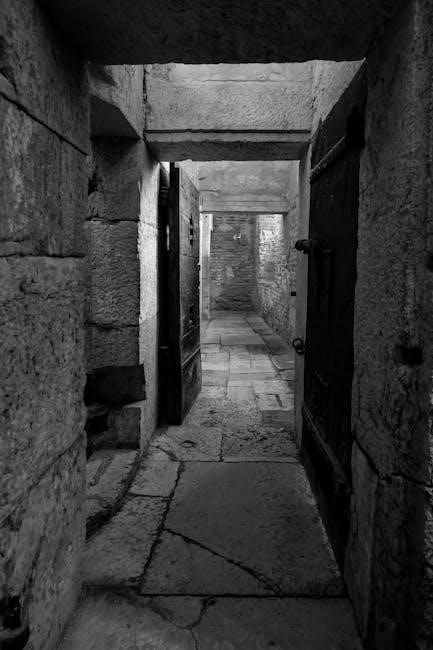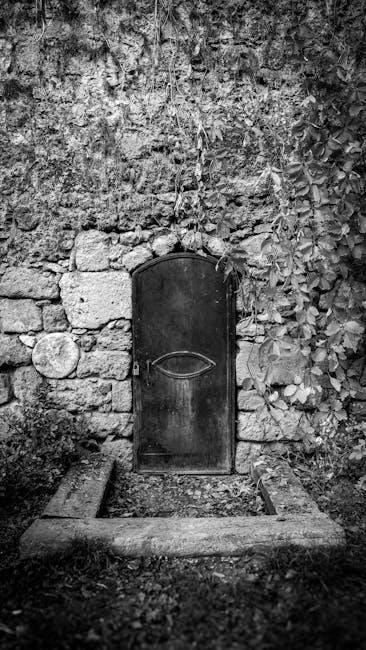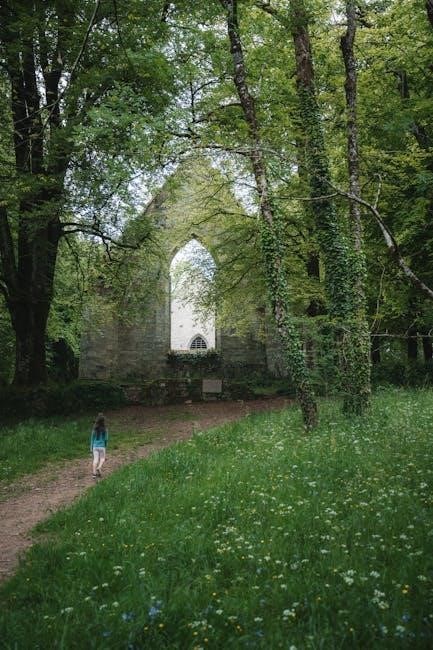Donna Tartt’s debut novel‚ “The Secret History‚” is a gripping tale of morality‚ guilt‚ and intellectualism‚ set in a prestigious liberal arts college.
The story follows Richard Papen and his elite group of friends‚ exploring themes of obsession and the consequences of their dark‚ secretive actions.
1.1 Overview of Donna Tartt’s Novel
The Secret History is a captivating novel by Donna Tartt‚ first published in 1992‚ that delves into themes of intellectualism‚ morality‚ and the consequences of actions.
The story revolves around a group of privileged college students studying Classics under an eccentric professor‚ exploring their obsession with beauty and their descent into darkness.
Narrated by Richard Papen‚ the novel unfolds as a dark‚ atmospheric tale of murder and guilt‚ set against the backdrop of a prestigious liberal arts college.
Tartt’s vivid storytelling and complex characters create a gripping exploration of human nature‚ making The Secret History a timeless and haunting literary masterpiece.
1.2 The Significance of the Title “The Secret History”
The title “The Secret History” reflects the hidden‚ exclusive narrative of the novel‚ emphasizing the private world of its characters.

It underscores the duality between the group’s intellectual pursuits and their darker‚ secretive actions‚ hinting at a truth concealed from the outside world.
The phrase “secret history” also suggests a parallel reality‚ where the characters’ obsessions and moral transgressions unfold‚ separate from the mainstream college experience.
This title captures the essence of their isolated‚ elitist existence‚ where beauty and knowledge mask their descent into guilt and consequence.

Plot Summary of “The Secret History”
The novel follows Richard Papen and his group of elite friends at a liberal arts college‚ exploring their descent into darkness after a tragic event‚ revealing their flaws and guilt.
2.1 The Story Setting: A Liberal Arts College
The story unfolds at an elite‚ picturesque liberal arts college on the East Coast‚ creating an atmosphere of intellectual exclusivity and isolation. This setting plays a crucial role in shaping the characters’ identities and their detachment from the outside world. The campus‚ with its classical architecture and serene surroundings‚ embodies the idealized version of academia that the characters strive to uphold. However‚ this idyllic backdrop contrasts sharply with the darker‚ more sinister events that unfold‚ highlighting the tension between appearance and reality. The college environment fosters both intellectual growth and moral ambiguity‚ setting the stage for the tragic events that define the narrative.
2.2 The Group of Students and Their Dynamics
The story revolves around a close-knit group of six students and their enigmatic classics professor‚ who form an intellectual clique at the college. The group consists of Richard Papen‚ the narrator‚ and his peers‚ each with distinct personalities that create a complex web of relationships. Their shared passion for classical studies and intellectual pursuits binds them together‚ but their dynamics are fraught with tension and underlying rivalry. Richard‚ an outsider eager to belong‚ becomes deeply entangled in their elite world. The group’s isolation from the rest of the college community exacerbates their sense of superiority and detachment‚ leading to a dangerous blurring of moral boundaries. Their interactions are marked by both intellectual camaraderie and subtle hostility‚ setting the stage for the tragic events that unfold.

Themes Explored in the Novel
The novel delves into themes of intellectualism‚ morality‚ and guilt‚ exploring how obsession with beauty and knowledge leads to dark consequences and moral decay.
3.1 The Seductive Power of Intellectualism
The novel portrays intellectualism as a double-edged sword‚ enchanting the characters with its beauty and exclusivity. Richard and his friends are captivated by classical studies‚ which become an escape from their mundane lives. Their professor’s charismatic teachings fuel their obsession‚ creating a sense of superiority. This pursuit of knowledge‚ however‚ leads them down a dangerous path‚ blurring the lines between morality and ambition. The seductive power of intellectualism is both alluring and destructive‚ driving the characters to justify their dark actions in the name of higher ideals. This theme highlights the risks of unchecked intellectual arrogance and its consequences.
3.2 Morality‚ Guilt‚ and the Consequences of Actions
The novel delves into the moral decay and psychological turmoil that follow Bunny’s death. Richard and his friends grapple with guilt‚ their actions haunting them long after the event. Their initial justification of the murder as a tragic necessity crumbles as reality sets in‚ revealing the harsh consequences of their choices. The weight of their secret isolates them‚ destroying their relationships and sense of self. This exploration of morality and guilt underscores the devastating impact of unchecked ambition and the enduring repercussions of sin.
Character Analysis

Richard Papen‚ the narrator‚ and the enigmatic Classics professor play central roles‚ shaping the group’s dynamics and moral dilemmas.
4.1 Richard Papen: The Narrator and His Fatal Flaw
Richard Papen‚ the narrator‚ is a complex character driven by his longing for the picturesque and acceptance into an elite group of Classics students.
His fatal flaw‚ as he admits‚ is his relentless pursuit of beauty and exclusivity‚ leading him into a world of moral ambiguity and tragic consequences.
Through his eyes‚ the story unfolds‚ revealing his inner turmoil and the dark events that bind him to his peers‚ forever altering their lives and psyches.
4.2 The Eccentric Classics Professor and His Influence
The enigmatic Classics professor plays a pivotal role in shaping the group’s intellectual and moral landscape. His charismatic teachings and obsession with classical ideals inspire devotion in his students.
He fosters an environment where the pursuit of beauty and knowledge transcends modern ethics‚ influencing the group to embrace an elitist worldview. His lectures are captivating‚ blending intellectual rigor with a sense of exclusivity.
However‚ his encouragement of extreme ideas inadvertently leads the students down a dangerous path‚ where the line between morality and intellectualism becomes increasingly blurred‚ culminating in tragic consequences.

The Legacy of “The Secret History”
Donna Tartt’s “The Secret History” remains a literary phenomenon‚ praised for its depth and dark elegance‚ leaving a lasting impact on modern literary discourse and culture.
5.1 Critical Reception and Popularity
Donna Tartt’s “The Secret History” has received widespread acclaim for its dark‚ atmospheric storytelling and profound exploration of human morality. Critics praise its intricate character development and philosophical depth‚ hailing it as a modern classic. The novel’s popularity endures‚ captivating readers with its haunting narrative and intellectual themes. While some critics argue its length and pacing‚ the book remains a cultural phenomenon. Its exploration of privilege‚ guilt‚ and the dangers of elitism resonates deeply. Fans and scholars alike continue to analyze its layered meanings‚ solidifying its place in contemporary literature. Despite divided opinions‚ its influence on modern storytelling is undeniable‚ making it a must-read for many. Its enduring appeal lies in its ability to provoke thought and emotion‚ ensuring its legacy as a landmark novel.
5;2 The Novel’s Impact on Modern Literature
Donna Tartt’s “The Secret History” has left an indelible mark on modern literature‚ inspiring a generation of writers with its rich‚ atmospheric prose and complex characters. Its exploration of dark themes and moral ambiguity has influenced contemporary literary fiction‚ encouraging authors to delve into deeper‚ more introspective storytelling. The novel’s success has also highlighted the enduring appeal of campus novels‚ blending intellectualism with suspense. Its loyal fan base and academic interest underscore its lasting relevance‚ ensuring its influence continues to resonate in both popular and literary circles. As a cultural touchstone‚ “The Secret History” remains a pivotal work shaping modern narrative trends and thematic explorations.
Availability of “The Secret History” in PDF Format
The novel is widely available in PDF format through official sources like libraries‚ eBooksellers‚ and academic platforms.
Ensure to access it ethically‚ respecting copyright laws.
6.1 Official Sources for Download
“The Secret History” in PDF format is accessible through official sources like Amazon‚ Barnes & Noble‚ and Apple Books.

These platforms offer secure purchases and downloads‚ ensuring high-quality versions of the novel.
Additionally‚ libraries like OverDrive may provide access to the eBook for members.
Official sources guarantee copyright compliance and support authors and publishers.
6.2 Ethical Considerations of Free Downloads
Downloading “The Secret History” for free from unofficial sources raises ethical concerns‚ as it violates copyright laws and deprives authors and publishers of fair compensation.
Piracy undermines the literary industry and discourages creators from producing quality work.
Supporting official sources ensures that writers like Donna Tartt receive the recognition they deserve.
Ethical consumption promotes a fair and sustainable creative ecosystem;
